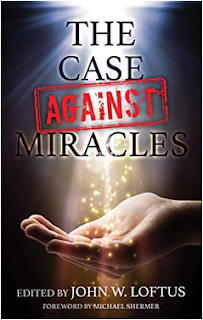Jonathan McLatchie Exposed for Being Disengenuous
 | ||
| Albrecht is a Catholic apologist. | |
 | ||
| Albrecht is a Catholic apologist. | |
It’s a good guess that the apostle Paul is partly to blame for the common belief that nature itself is proof of God. He wrote this in his letter to the Romans (1:20): “Ever since the creation of the world his eternal power and divine nature, invisible though they are, have been understood and seen through the things he has made.” So just look around you to see God’s stunning handiwork. One modern theologian, Barry Whitney, illustrates how theists can get swept up in this sentimental view of nature:
I give this book two thumbs way up. In addition to courageously sharing his personal story, Loftus applies his considerable training and expertise into developing a cumulative case against Christianity and for atheism. I cannot think of another book like it on the market. Loftus is clearly familiar with the work of evangelical apologists like Copan, Craig, Geisler, and Moreland, as his book is filled with references to their work and objections to their arguments. In fact, his book might best be described as a “counter-apologetics” textbook.
--Jeffery Jay Lowder. LINK.

Untangling the mess of Christian origins
Once upon a time—way back when the overwhelming majority of people were illiterate—God decided that the best way to tell people about himself was to write a book. That is, so the theologians assure us, he inspired humans to write it for him. Dropping a book in an illiterate world? This doesn’t strike us as a good plan, and it went downhill. Once the book was finally finished, God neglected to find a way to prevent mistakes as the manuscripts were copied by hand for centuries: thousands of errors were made. Scholars still haven’t been able to figure out for sure the wording of the original manuscripts. And, for centuries, God couldn’t find a way to make the book available to the masses. Even after the printing press had been invented, religious leaders resisted having the Bible translated into the languages of the people. Even now, with billions of copies available, this holy book is a dud, by which I mean that most of the faithful don’t like to read it. Actually read it, take to heart the idea that God’s word is there for the taking. If they really believed that, we wouldn’t be able to stop them from reading it.
Theology was more important than history
It is commonly considered an act of piety to read the Bible cover-to-cover. But once undertaken, this effort sometimes undermines piety—as it did for Mark Twain: “It is not the things which I do not understand in the Bible which trouble me, but the things which I do understand.” Not that I would discourage anyone from reading the Bible, in fact quite the opposite, as I argued in an article here a few weeks ago. Just don’t read it, however. Look at every chapter as an occasion to sharpen critical thinking skills; ask the right questions, e.g., where did this text come from, what was the motivation of the author, does it embody good or bad theology? —but especially, does it really pass muster as “word of a god”? Every Bible chapter should be scrutinized.
Are you satisfied with an image of Jesus on a potato chip?
For a very long time, Christianity has depended on amateur and professional excuse-makers to keep it going. It makes claims about reality—that there is a good, all-powerful god keeping watch over everything—but even the most devout Christians don’t have to look far to see so much that disconfirms this belief. Hence excuses are needed to keep the faith, to protect Christianity from buckling and crumbling. Believers are desperate for excuses because there is so much emotional investment in believing.
The amateurs come up with excuses based on naïve concepts learned in Sunday school, e.g., a mother of two young children died suddenly because “god needed her in heaven”—or simply because god works in mysterious ways; the conclusion that god is absent cannot be seriously entertained. Of course, there are those who abandon the faith because they are appalled by such excuses.
The church has done such a good job idealizing and promoting Jesus that its rank and file members aren’t even aware of strikes one and two. They don’t study and probe. They rarely ask: where did our beliefs come from?
Strike One:
Where did the gospels come from? Since these documents overflow with details about Jesus—his coming and goings, sayings, impressive miracles—it has been commonly assumed by the laity that they were written by people who knew Jesus. It has been easier to think this because they are “according to” Matthew, Mark, Luke and John: these names add a personal touch. But when historians—including pious believers—began applying to the gospels the same standards they apply to other documents from the ancient world, the common assumptions about gospel origins didn’t hold up. In fact, it has been a struggle—and oh how Christian scholars have tried—to find a way to demonstrate that the gospels qualify as history.
In the documents themselves no authors claim credit, e.g., “written by Mark,” nor are any of them signed and dated. We don’t have any idea either where they were written, that is, where the authors lived. There has been an awful lot of guesswork and speculation, but it remains just that.
We mark the anniversary of the January 6 insurrection by hearing FFRF attorney Andrew Seidel describe the Christian Nationalism of the rioters. Representative Don Beyer (VA) explains why he is a member of the Congressional Freethought Caucus and we hear Representative Jamie Raskin (MD) stressing the need to talk about fascism. Then we talk with former evangelical minister and Christian apologist, John W. Loftus, about his new anthology God and Horrendous Suffering. LINK.It's a good one!
Labels: God and Horrendous Suffering
Let me share with you here a few of my fantasies about resolutions for 2022 that Christians could and should make. These have to do with religious practice itself, i.e., holding themselves accountable to some of the standards they themselves—we would have to assume—consider appropriate. These resolutions have to do with becoming better Christians.
I have four in mind.
Tis the day before Christmas, so what better time to take a close look at the nativity stories? If only we could get faithful church-goers to do the same. They could see that the church has been getting away with far too much. A couple of months ago I visited a church in a town near Milan. I found all the usual imagery, including, near the entrance—off to the side in the shadows—the traditional Nativity Scene, which included the Three Wise Men kneeling before the baby Jesus asleep in the manger.
No: this is not what we find in the gospels. I wonder: if you ask Christians coming out of church: “Where do we find the stories of the birth of Jesus?” …how many could tell you? Actually, the birth event itself is mentioned only once, in Luke 2. In Matthew 2, we find a description of what happened some time later. Let’s take a close look at both.
Labels: 12 Days of Solstice
Labels: 12 Days of Solstice


Labels: 12 Days of Solstice
Throughout history, arguments for and against the existence of God have been largely confined to philosophy and theology. In the meantime, science has sat on the sidelines and quietly watched this game of words march up and down the field. . . . In my 2003 book, Has Science Found God? I critically examined the claims of scientific evidence for God and found them inadequate. In this present book, I will go much farther and argue that by this moment in time science has advanced sufficiently to be able to make a definitive statement on the existence or nonexistence of a God having the attributes that are traditionally associated with the Judeo-Christian-Islamic God. --From the Preface to God: The Failed Hypothesis.After disagreeing with my chosen title for Christianity is not Great, highlighted earlier on day six of the twelve days of Solstice, Prometheus Books accepted my book proposal on the condition they would have the final say in naming it. They basically didn't want it named after Stenger's NY Times Bestselling book, such as Christianity: The Failed Hypothesis. After eliminating a few titles it came down to two:
Labels: 12 Days of Solstice
Labels: 12 Days of Solstice
Labels: 12 Days of Solstice
The ongoing damage caused by religion
Here’s a rant against Jews that should horrify all Christians:
“… set fire to their synagogues or schools…bury and cover with dirt whatever will not burn, so that no man will ever again see a stone or cinder of them…I advise that their houses also be razed and destroyed. For they pursue in them the same aims as in their synagogues… I advise that all their prayer books and Talmudic writings, in which such idolatry, lies, cursing and blasphemy are taught, be taken from them…I advise that their rabbis be forbidden to teach henceforth on pain of loss of life and limb…I advise that safe-conduct on the highways be abolished completely for the Jews. For they have no business in the countryside, since they are not lords, officials, tradesmen, or the like…I advise that usury be prohibited to them, and that all cash and treasure of silver and gold be taken from them and put aside for safekeeping…I commend putting a flail, an ax, a hoe, a spade, a distaff, or a spindle into the hands of young, strong Jews and Jewesses and letting them earn their bread in the sweat of their brow…”
Labels: 12 Days of Solstice
Labels: 12 Days of Solstice
Labels: 12 Days of Solstice
Here are some blurbs for my anthology The End of Christianity.
The
Christian Delusion is the first book I give to anyone who wants to understand
why I am no longer a Christian. Loftus and company have returned with The End
of Christianity, which will now be the second book I give to anyone who wants
to read a substantive case against Christian faith.” —Luke Meuhlhauser, owner
of the popular blog Common Sense Atheism, which named Loftus’s book Why I Became an
Atheist as the Best Atheism Book of the Decade (2000-2009).